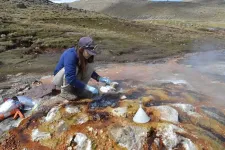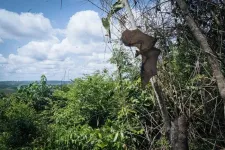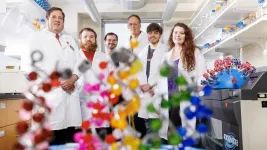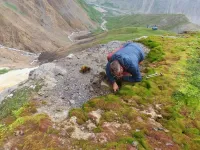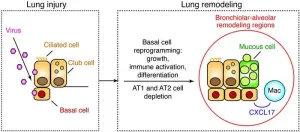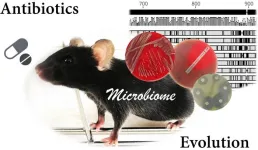(Press-News.org) LOGAN, UTAH, USA -- South America’s Andes Mountains, the world’s longest mountain range and home to some of the planet’s highest peaks, feature thousands of hot springs. Driven by plate tectonics and fueled by hot rock and fluids, these thermal discharges vary widely in geochemistry and microbial diversity.
Utah State University geoscientists, along with colleagues from Montana State University, examined 14 hot springs within the southern Andes in Peru and discovered microbial community composition is distinctly different in two tectonic settings. Dennis Newell, associate professor in USU’s Department of Geosciences, and recent USU graduate Heather Upin, MS 2020, report findings in the April 11 online issue of Nature’s Communications Earth & Environment. Their research is supported by the National Science Foundation and the Geological Society of America.
“We know tectonic processes control hot spring temperature and geochemistry, yet how this, in turn, shapes microbial community composition is poorly understood,” says Newell, USU Geosciences graduate director.
The scientists collected geochemical and 16S ribosomal RNA gene sequencing data from hot springs in regions with contrasting styles of subduction — flat-slab and back-arc — and noted similarities in pH but found differences in geochemistry and microbiology.
“Flat-slab hot springs were chemically heterogeneous, had modest surface temperatures and were dominated by members of the metabolically diverse phylum Proteobacteria,” Newell says.
In contrast, the back-arc hot springs were more geochemically homogenous, had hotter water, exhibited high concentrations of dissolved metals and gases, and were home to heat-loving archaeal and bacterial organisms.
“These results tell us tectonics matter when it comes microbial community make-up, but little research has been conducted around the world to demonstrate this,” Newell says.
Further investigation, with efficient genomic research, at sites around the globe could reveal how microbes have evolved in tectonically diverse environments, he says.
END
Tectonics matter: USU geoscientists probe geochemistry, microbial diversity of Peruvian hot springs
Heather Upin, Dennis Newell report microbial community composition is distinctly different in two tectonic settings
2023-06-06
ELSE PRESS RELEASES FROM THIS DATE:
To prevent future pandemics, leave bats alone
2023-06-06
A new paper in the journal The Lancet Planetary Health makes the case that pandemic prevention requires a global taboo whereby humanity agrees to leave bats alone—to let them have the habitats they need, undisturbed.
Like the SARS coronavirus outbreak of 2003, the COVID-19 pandemic can be traced back to a bat virus. Whether someone handled or ate an infected bat or was exposed to a bat’s bodily fluids in a cave or some other way, or was exposed to another animal that had been infected by a bat, we will quite likely never know. Even a virus released via a lab accident would still have originally come from ...
Investments advance brain research, name MRI for longtime BrainHealth couple
2023-06-06
The Laurie and Todd Platt BrainHealth Project MRI Scanner will help researchers identify neural markers of improved brain health
Center for BrainHealth® celebrates major contributions reaching more than $1 million to support discoveries of brain improvement biomarkers. This investment in advancing the science of brain health is made possible by Sarah and Ross Perot, Jr., Laurie and Todd Platt and many of their friends.
The Sammons BrainHealth Imaging Center is dedicated to discovering a scalable panel of brain measurements correlating physical changes in the brain with changes in a holistic composite metric of brain ...
Nebraska scientists closing in on long-lasting swine flu vaccine
2023-06-06
A successful long-term experiment with live hogs indicates Nebraska scientists may be another step closer to achieving a safe, long-lasting and potentially universal vaccine against swine flu.
The results are not only important to the pork industry, they hold significant implications for human health. That’s because pigs act as “mixing vessels,” where various swine and bird influenza strains can reconfigure and become transmissible to humans. In fact, the 2009 swine flu pandemic, involving ...
Bubble, bubble, more earthquake trouble? Geoscientists study Alaska's Denali fault
2023-06-06
LOGAN, UTAH, USA -- The 1,200-mile-long Denali Fault stretches in an upward arc from southwestern Alaska and the Bering Sea eastward to western Canada’s Yukon Territory and British Columbia. The long-lived and active strike-slip fault system, which slices through Denali National Park and Preserve, is responsible for the formation of the Alaska Range.
“It’s a big, sweeping fault and the source of a magnitude 7.9 earthquake in 2002, that ruptured more than 200 miles of the Denali Fault, along with the Totschunda Fault to the east, causing significant damage to remote villages and central Alaska’s infrastructure,” says Utah State University ...
Movement symptoms in dystonia are caused by spinal cord dysfunction
2023-06-06
Many neurological conditions that involve involuntary muscle contractions have long been considered as diseases of the brain. However, both the brain and the spinal cord contain many nerve cells associated with movement.
The research, published in Science Translational Medicine, used state-of-the-art mouse genetics to distinguish whether the brain or spinal cord was responsible for the disorganisation of movement experienced by dystonia patients.
Focusing on the most common inherited form of dystonia called DYT1, UCL scientists confined a genetic mutation to the spinal cord of the ...
Why are dog breeds with innate diseases popular?
2023-06-06
Flat-faced dogs, such as French and English Bulldogs, are extremely popular despite suffering from severe innate diseases. Hungarian researchers have attempted to uncover the explanation for this paradox. In the end, they concluded that although enthusiasts of flat-faced dogs are aware of the health issues and strive to provide the best for their dogs, they are likely to normalize health problems.
The French and English Bulldogs are among the most popular breeds in both the United States and Europe, but Pugs ...
Nursing home dementia residents’ care linked to majority presence, UC Irvine-led study finds
2023-06-06
Irvine, Calif., June 6, 2023 — The quality of care for nursing home residents with Alzheimer’s disease and related dementias is best when they are in the majority, but most facilities also accommodate a heterogeneous population, where specialized staff training is limited, according to a study led by the University of California, Irvine.
“Recognizing and managing the complex medical conditions and behavioral symptoms of residents with ADRD require enhanced knowledge among staff. These findings raise significant concerns regarding the level of care and quality of life for the majority of these people, highlighting ...
SRF operations earns certification to ensure customer satisfaction
2023-06-06
NEWPORT NEWS, VA – An important certificate now hangs on the wall of the Superconducting Radiofrequency Operations group at the U.S. Department of Energy’s Thomas Jefferson National Accelerator Facility.
SRF Operations builds cryomodules and other particle accelerator parts for the lab’s very own Continuous Electron Beam Accelerator Facility (CEBAF), a DOE Office of Science user facility. The group also supports user facilities at other DOE labs, including SLAC National Accelerator Laboratory and Oak Ridge National Laboratory. This piece of paper represents the department’s dedication to supplying ...
Two new studies identify promising pathways to treat chronic COVID-19
2023-06-06
Philadelphia, June 6, 2023 – Early studies of COVID-19 focused on the acute phase of the disease. However, attention has now turned to the long-term consequences of the disease, which are also significant causes of morbidity and mortality. Two studies reported in The American Journal of Pathology, published by Elsevier, seek to understand the drivers of the chronic and sometimes progressive phase of the disease and identify possible pathways for drug treatment.
The COVID-19 pandemic has highlighted ...
How the gut microbiome responds to antibiotics
2023-06-06
Each person's gut microbiome contains a specific community of microorganisms that normally remains stable for years. However, it can be thrown off balance by factors such as dietary changes, infections or medications. Antibiotics in particular have a strong influence on the microbiome. In response, microorganisms employ various resistance mechanisms, with individual bacterial populations evolving through selection of antibiotic-resistant variants. Yet, the extent and mechanisms of these processes and their impact on the ecology of the microbial community are ...
LAST 30 PRESS RELEASES:
Hairdressers could be a secret weapon in tackling climate change, new research finds
Genetic risk for mental illness is far less disorder-specific than clinicians have assumed, massive Swedish study reveals
A therapeutic target that would curb the spread of coronaviruses has been identified
Modern twist on wildfire management methods found also to have a bonus feature that protects water supplies
AI enables defect-aware prediction of metal 3D-printed part quality
Miniscule fossil discovery reveals fresh clues into the evolution of the earliest-known relative of all primates
World Water Day 2026: Applied Microbiology International to hold Gender Equality and Water webinar
The unprecedented transformation in energy: The Third Energy Revolution toward carbon neutrality
Building on the far side: AI analysis suggests sturdier foundation for future lunar bases
Far-field superresolution imaging via k-space superoscillation
10 Years, 70% shift: Wastewater upgrades quietly transform river microbiomes
Why does chronic back pain make everyday sounds feel harsher? Brain imaging study points to a treatable cause
Video messaging effectiveness depends on quality of streaming experience, research shows
Introducing the “bloom” cycle, or why plants are not stupid
The Lancet Oncology: Breast cancer remains the most common cancer among women worldwide, with annual cases expected to reach over 3.5 million by 2050
Improve education and transitional support for autistic people to prevent death by suicide, say experts
GLP-1 drugs like Ozempic could cut risk of major heart complications after heart attack, study finds
Study finds Earth may have twice as many vertebrate species as previously thought
NYU Langone orthopedic surgeons present latest clinical findings and research at AAOS 2026
New journal highlights how artificial intelligence can help solve global environmental crises
Study identifies three diverging global AI pathways shaping the future of technology and governance
Machine learning advances non targeted detection of environmental pollutants
ACP advises all adults 75 or older get a protein subunit RSV vaccine
New study finds earliest evidence of big land predators hunting plant-eaters
Newer groundwater associated with higher risk of Parkinson’s disease
New study identifies growth hormone receptor as possible target to improve lung cancer treatment
Routine helps children adjust to school, but harsh parenting may undo benefits
IEEE honors Pitt’s Fang Peng with medal in power engineering
SwRI and the NPSS Consortium release new version of NPSS® software with improved functionality
Study identifies molecular cause of taste loss after COVID
[Press-News.org] Tectonics matter: USU geoscientists probe geochemistry, microbial diversity of Peruvian hot springsHeather Upin, Dennis Newell report microbial community composition is distinctly different in two tectonic settings
